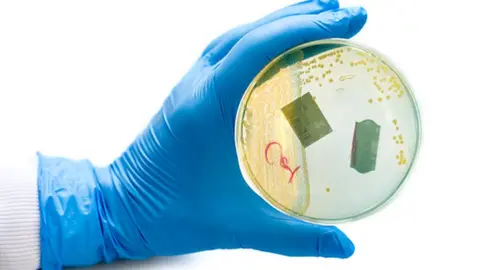International Women's Day: UTI testing '50 years out of date'
 BBC
BBCA painful infection that mainly affects women is too often dismissed as "women's problems".
One in every two women suffer a urinary tract infection (UTI) and they are the second most common infection globally.
Among those affected is Hannah Hanratty, 36, who suffered months of agony despite multiple negative tests.
But a scientist in Wales has now developed a device to improve testing and said the current system is "50 years out of date".
It was during her pregnancy that Mrs Hanratty, from Swansea, felt the "razor-blade burning pain" when passing urine. It soon developed into a constant pain.
Tests for a UTI repeatedly came back negative, causing her to worry something was wrong with her unborn baby.
"I was in so much pain at the end - I was just trying to get through each day," she said.
At 37 weeks she was induced to have her daughter early, so doctors could carry out more tests without harming the baby.
 Hannah Hanratty
Hannah HanrattyTwo weeks after giving birth she needed antibiotics following a routine procedure and said the pain immediately went.
"It was a UTI all along that just hadn't been picked up by the tests," she said.
As a pelvic health physiotherapist, working with the urogynaecology department at Swansea Bay University Health Board, Mrs Hanratty's experience made her passionate about improving outcomes for her own patients.
"It really affects their mental health and many of them can be suicidal, so it really needs to be taken seriously," she said.
Dr Emma Hayhurst, a senior lecturer in Molecular Biology at the University of South Wales, agreed.
"Everyone acknowledges the current testing regime is out of date," she said.
"They [UTIs] affect one in every two women and yet the diagnostics that we're using for them are 50 years out of date."

At the moment a UTI patient may be asked to provide a urine sample which is sent for analysis, with tests back in two to three days.
"That's not good enough, we need to make it quicker," said Dr Hayhurst, explaining that the device she's working on would reduce that.
"Within 30 minutes the clinician will be able to say what bacteria is causing the UTI and indeed whether there is a UTI in the first place."
'Feel dismissed'
UTIs are among the most common types of infections and an NHS report said it affects more than 92 million people worldwide.
Dr Hayhurst has received a £50,000 Women in Innovation Award to further her work, but also in recognition of her position as a female role model in the field of science, technology, engineering and medicine - or STEM subjects, as they're also known.
"We should be listening to the women who are telling us this is a problem in their lives, but we know many feel like they are being dismissed," she said.
"We have suffered a lack of strong female representation at senior levels in research and in business and that definitely feeds through.
"You tend to innovate in areas that you understand and care about, and so if we always have the same people innovating, then we're always going to come up with the same solutions."
'Unconscious bias'
Wales' Health Minister Eluned Morgan is due to publish a quality statement on women's health in the summer, and has announced funding for each health board to have a specialist endometriosis nurse.
"I feel I have particular responsibility, as the first woman health minister in a long time, to make sure we look at the issue of women's health in a lot more detail," she said.
"There are clearly some gaps, certainly when it comes to research, but also in terms of where people are concentrating their efforts and investment.
"Quite often, women are not heard in the same way as men are heard and we've really got to make sure we are rebalancing that unconscious bias."
 SPL
SPLWhat are urinary tract infections?
UTIs are usually caused by bacteria, most commonly from a person's own bowels, entering the urinary tract through the urethra, the tube that carries urine out of the body.
Women have a shorter urethra than men, which means bacteria are more likely to reach the bladder or kidneys and cause an infection.
Symptoms of UTI include a burning feeling on passing urine and the sensation of needing to pass urine frequently, fever, shivers and pain.
How many women does it affect?
About 50% of women in the UK will get a urinary tract infection and the National Institute for Health and Care Excellence (NICE) estimates that by the age of 24, nearly one third of women would have had at least one episode of cystitis.
NICE, which provides national guidance and advice to improve health and social care, also said up to 30% of women have a recurrence of a UTI. It is much less common in men which NICE says s attributed to the shorter urethra in women.

- CURL UP WITH A GOOD BOOK: Aberystwyth book club members review their latest read
- THE GIFT: A celebration of John Cale

